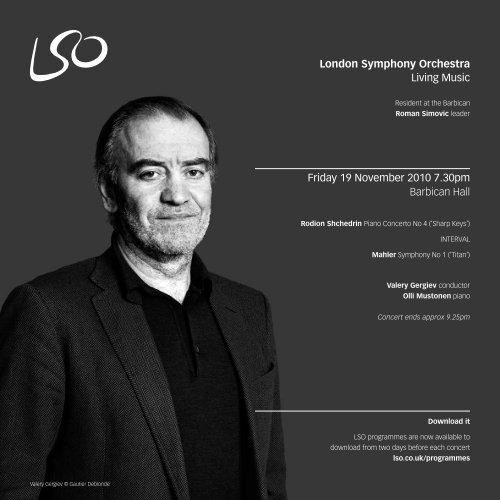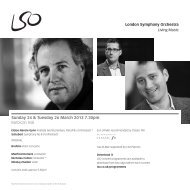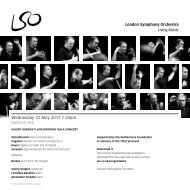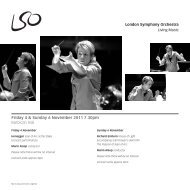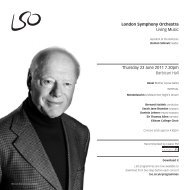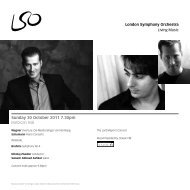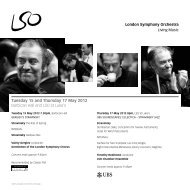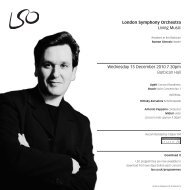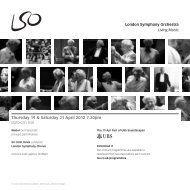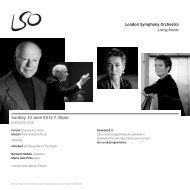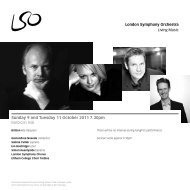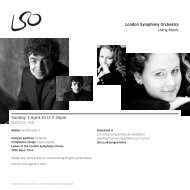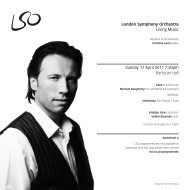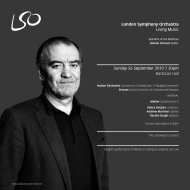19 November programme - London Symphony Orchestra
19 November programme - London Symphony Orchestra
19 November programme - London Symphony Orchestra
Create successful ePaper yourself
Turn your PDF publications into a flip-book with our unique Google optimized e-Paper software.
Valery Gergiev © Gautier Deblonde<br />
<strong>London</strong> <strong>Symphony</strong> <strong>Orchestra</strong><br />
Living Music<br />
Resident at the Barbican<br />
Roman Simovic leader<br />
Friday <strong>19</strong> <strong>November</strong> 2010 7.30pm<br />
Barbican Hall<br />
Rodion Shchedrin Piano Concerto No 4 (‘Sharp Keys’)<br />
INTERVAL<br />
Mahler <strong>Symphony</strong> No 1 (‘Titan’)<br />
Valery Gergiev conductor<br />
Olli Mustonen piano<br />
Concert ends approx 9.25pm<br />
Download it<br />
LSO <strong>programme</strong>s are now available to<br />
download from two days before each concert<br />
lso.co.uk/<strong>programme</strong>s
Welcome News<br />
A warm welcome to the Barbican for this evening’s LSO concert which<br />
is dedicated to Maurice Murphy, the LSO’s extraordinary, and much<br />
loved, Principal Trumpet from <strong>19</strong>77–2007.<br />
Tonight, LSO Principal Conductor Valery Gergiev returns to continue<br />
his exploration of the music of fellow Russian Rodion Shchedrin.<br />
We presented Piano Concerto No 5 in September in the LSO’s<br />
season opening concert, and tonight we welcome Finnish pianist<br />
Olli Mustonen to perform the Piano Concerto No 4 (‘Sharp Keys’).<br />
In 2011 Gergiev turns to the music of two more of his countrymen,<br />
Shostakovich and Tchaikovsky. He begins a year-long Tchaikovsky<br />
symphonies cycle with the LSO on 18 January, pairing these with<br />
Shostakovich violin concertos performed by the young Armenian<br />
violinist Sergey Khachatryan making his debut with the LSO, and with<br />
Leonidas Kavakos, making a welcome return in March.<br />
Tomorrow morning the LSO and Gergiev leave on tour to Japan for a<br />
fortnight, where they will perform <strong>programme</strong>s of Mahler and Sibelius<br />
in Tokyo, Osaka and a number of other cities. I hope you can join us<br />
for the <strong>Orchestra</strong>’s return to the Barbican on 5 December when we<br />
see a different side to Mahler.<br />
Tonight’s concert features Mahler’s First <strong>Symphony</strong> – an appropriate<br />
tribute to Maurice Murphy’s memorable performances with the LSO,<br />
and to the great tradition of British brass playing which he championed.<br />
Kathryn McDowell LSO Managing Director<br />
2 Welcome & News<br />
Donatella Flick Conducting Competition – 2010 winner<br />
Congratulations to Clemens Schuldt, winner of the 2010 final of the<br />
Donatella Flick Conducting Competition, held at the Barbican on<br />
4 <strong>November</strong>. As a key part of his prize, 27-year-old German conductor<br />
Clemens will become Assistant Conductor of the LSO for the next two<br />
years. He was awarded the prize by HRH The Duke of Kent, Donatella<br />
Flick and a distinguished international jury. In the final, he conducted<br />
the LSO in Johann Strauss’s Overture to Die Fledermaus and Wagner’s<br />
Prelude and Liebestod from Tristan und Isolde.<br />
www.conducting.org<br />
LSO String Experience Scheme<br />
Congratulations also to the 20 young string players who have been<br />
selected from recent auditions to take part in the 2010/11 LSO<br />
String Experience Scheme. The Scheme enables string students<br />
from <strong>London</strong> music conservatoires to gain professional experience<br />
by playing in rehearsals and concerts with the LSO. Participants are<br />
treated as professional ‘extra’ players and are paid for their work in<br />
line with LSO section players. We are very grateful to the Musicians<br />
Benevolent Fund and to Charles and Pascale Clark for their generous<br />
support of the Scheme.<br />
lso.co.uk/stringexperience<br />
Music’s better shared!<br />
There’s never been a better time to bring all your friends to<br />
an LSO concert. Groups of 10+ receive a 20% discount on<br />
all tickets, plus a host of additional benefits.<br />
Call the dedicated Group Booking line on 020 7382 7211,<br />
visit lso.co.uk/groups or email groups@barbican.org.uk<br />
The LSO is delighted to welcome the following groups tonight:<br />
Gerrards Cross Community Association<br />
King Edward VI Grammar School, Chelmsford<br />
Mariinsky Theatre Trust<br />
MAURICE<br />
MURPHY<br />
<strong>19</strong>35–2010<br />
LSO Principal Trumpet: <strong>19</strong>77–2007<br />
A tribute by LSO Chairman<br />
Lennox Mackenzie<br />
Maurice Murphy was a truly extraordinary<br />
and wonderful man who inspired us all.<br />
He inspired us not only when he put his beloved trumpet to his lips<br />
to create that pure, thrilling and golden sound that we all know and love;<br />
but he inspired us also with his very inner being, displaying generosity<br />
of spirit, care, and love to one and all. Maurice was in short a musical<br />
giant, a loving family man, a true gem and everyone’s hero. He was<br />
also extremely modest, often saying ‘I’m just another trumpet player –<br />
I’ve been very lucky’. Well, I think everyone who has met Maurice has<br />
been lucky, to have known this great, humble and special man.<br />
Maurice was born in <strong>London</strong>, however, four years later war broke<br />
out and the family returned to the North of England. There were<br />
many brass bands in the area, so Maurice used to say it was just<br />
‘natural’ that he took up the instrument, which he did when he<br />
was six. He played with his Dad in the West Stanley Salvation Army<br />
Band in County Durham, and by twelve he had won the All Britain<br />
Cornet Championships.<br />
Kathryn McDowell © Camilla Panufnik Maurice Murphy 3
Maurice Murphy remembered<br />
Maurice became Principal Cornet with the Fairey Aviation Band and<br />
subsequently received the top job, the highest accolade in the Brass<br />
Band world – Principal Cornet of the Black Dyke Mills Band. His time<br />
there is still remembered with huge affection and admiration, and his<br />
presence remains in Northern brass band folklore and legend.<br />
He started playing with the local orchestras<br />
including the Hallé, the Royal Liverpool<br />
Philharmonic and the BBC Northern (now the<br />
BBC Philharmonic), and also enjoyed gigs in<br />
theatres and dance bands. Yorkshire choral<br />
societies used to stagger their traditional<br />
Christmas performances of Handel’s Messiah<br />
so that Maurice could play ‘The Trumpet Shall<br />
Sound’ in all of them.<br />
Maurice with his father Billy<br />
front second and third from right He joined the BBC Northern and stayed with<br />
Crookhall Band, Oct <strong>19</strong>51<br />
them for 16 years, ignoring various attempts<br />
to lure him down to <strong>London</strong>. Eventually, he accepted a trip to Mexico<br />
with the LSO and was often spotted wandering the Mexico City streets<br />
wearing a sombrero. Consequently he was offered the position of<br />
Principal Trumpet of the LSO which he accepted, little realising that his<br />
first engagement with the <strong>Orchestra</strong> as a member would bring him<br />
worldwide acclaim and international stardom.<br />
John Williams was in town and the LSO was recording the music<br />
for Star Wars. Maurice was cast straight into ‘Opening Titles’ with<br />
its heroic, diamond-sharp fanfares and blistering top Cs. He stamped<br />
his very own imprint and sound on the music, which still takes your<br />
breath away over three decades later, and instantly he gained<br />
legendary status. John Williams, ‘The Governor’ as Maurice called<br />
him, was over the moon with the performance and returned for<br />
many more films with Maurice’s sound very much in mind as he<br />
put pen to paper. Maurice alone was responsible for Hollywood<br />
bringing major film scores to be recorded here in Britain, benefiting<br />
thousands of UK musicians.<br />
Maurice was a totally natural player. He would amaze his colleagues<br />
by walking onto the stage without having warmed up or played a note,<br />
and produce an immaculate Mahler Fifth <strong>Symphony</strong>. He also had the<br />
unique ability to lift the <strong>Orchestra</strong> single-handedly and to stimulate it<br />
to greater things. Sir Colin Davis remembers an especially exhausted<br />
LSO playing Sibelius on a Russian tour: ‘We needed a lift from<br />
somewhere’, he said, ‘I looked at Maurice who gave me a big smile,<br />
picked up the LSO and made me a present of it’.<br />
But the part of Maurice’s make-up I shall always remember him most<br />
for was his care and concern for his fellow man. He loved, protected<br />
and cared for his section like no other.<br />
On one occasion we were in Chicago and there was an icy blizzard<br />
blowing. Outside <strong>Symphony</strong> Hall a tuba player was busking. Maurice<br />
was concerned for the player, thinking he could do himself some<br />
harm, so a spontaneous collection was made from the brass players<br />
and as Maurice was not in the first half he was despatched to give<br />
the tuba player the money. The next time we saw Maurice was at the<br />
interval, his leg and foot heavily bandaged, limping and walking with a<br />
stick! He had handed over the money and then had promptly slipped<br />
over in the icy snow. For the rest of the tour the trumpet section took<br />
it in turns to push Maurice around in a wheelchair, but the cold tuba<br />
player enjoyed his early finish in the warm.<br />
Maurice loved American tours but nowhere more so than Daytona<br />
Beach. The golf courses are sensational there and Maurice had<br />
designed the trumpet box intended to carry his instruments around<br />
the world with space for his golf clubs. It was a joy to watch Maurice<br />
in his element sweetly striking his golf ball far down the fairway.<br />
When Maurice was present, there was always humour and lots of<br />
jokes. We were rehearsing one day in Daytona and all of a sudden<br />
the lights went out and the hall was plunged into darkness. It all went<br />
quiet and Maurice’s voice was heard saying ‘Bad play stops light’.<br />
Maurice thrilled us at the LSO for 30 glorious years and was much<br />
in demand in the freelance world too, where he absolutely loved to<br />
join trumpeters from the jazz and light music world, making many<br />
close friendships.<br />
When the time came for Maurice to retire, nobody wished for that<br />
to happen. It was premature. We all loved him and he was playing<br />
as well as ever, if not better. So every year for seven years he was<br />
asked to stay for another year, with the unanimous backing of the<br />
<strong>Orchestra</strong> members.<br />
At his final retirement party – and there were many – Maurice was<br />
asked to say a few words. ‘I hate making speeches’, he said, ‘I’d rather<br />
play another Mahler Five’. He intimated he found the travelling harder<br />
and said, ‘Anyway, I thought I would award myself with the DCM<br />
before someone else does’. DCM? ‘Don’t Come Monday’. Little did<br />
Maurice realise that a real award was on the way, a most deserved<br />
MBE in recognition of services to music.<br />
Maurice was never happier than when being with his wife Shirley<br />
and their family, his son Martin and his wife Helen and their son Sam.<br />
It was earlier this year that Maurice and Shirley celebrated their<br />
golden wedding anniversary.<br />
Maurice has touched us all. His memory will live with us forever.<br />
Lennox Mackenzie<br />
Maurice Murphy<br />
<strong>19</strong>35 Born in Hammersmith<br />
<strong>19</strong>41 Began studying the cornet<br />
<strong>19</strong>47 Became All England Juvenile Solo Champion<br />
<strong>19</strong>56–61 Solo Cornet with Black Dyke Mills Band<br />
<strong>19</strong>61–76 Principal Trumpet with the BBC Northern<br />
Feb 77 Joined the <strong>London</strong> <strong>Symphony</strong> <strong>Orchestra</strong> as Principal Trumpet<br />
Mar 77 LSO recorded Star Wars with Maurice Murphy playing solo<br />
trumpet on his first day with the <strong>Orchestra</strong><br />
Jun 07 Retired from the LSO<br />
2008 Received the Honorary Award of the International Trumpet<br />
Guild, ‘given to those who have made extraordinary<br />
contributions to the art of trumpet playing’<br />
2010 Awarded an MBE in the New Year’s Honours List<br />
4 Maurice Murphy<br />
Photos © Clive Barda, Robert Hill, Anthony Haas<br />
Maurice Murphy 5
Rodion Shchedrin (b <strong>19</strong>32)<br />
Piano Concerto No 4 (‘Sharp Keys’) (<strong>19</strong>91)<br />
1 Sostenuto cantabile – Allegretto – Sostenuto<br />
2 ‘Russian Chimes’ – Allegro<br />
Olli Mustonen piano<br />
Since Prokofiev and Shostakovich the number of front-rank<br />
composers who could also claim to be first-rate concert pianists has<br />
dwindled remarkably, and of the remaining few, hardly any have made<br />
piano music as strong a feature of their output as Rodion Shchedrin.<br />
Trained as a composer under Yuri Shaporin and as a pianist under<br />
Yakov Flier, he has composed six piano concertos to date, as well as<br />
a substantial body of solo piano works.<br />
In this area Shchedrin has generally shown more affinity for<br />
Prokofiev than for Shostakovich, especially in the concertos, which<br />
at least initially were marked by vivid colours, forceful energy and<br />
total absence of self-doubt. His First Piano Concerto, for instance,<br />
a graduation piece from <strong>19</strong>54, was an extrovert romp that could have<br />
been designed as a tribute to Prokofiev, who had died the previous<br />
year. Twelve years later, the Second Concerto retained that influence,<br />
alongside a playful indulgence in twelve-note techniques. However,<br />
nearly 20 years separate the first three piano concertos, all of which<br />
Shchedrin premiered and recorded with himself as soloist, from the<br />
last three (No 3 was composed in <strong>19</strong>73, No 4 in <strong>19</strong>91 to a commission<br />
from the Steinway Foundation). In this second phase, exhibitionism<br />
gives way to a more private, exploratory tone.<br />
According to the composer, ‘The entire [Fourth Piano Concerto] is<br />
in the sharp keys; there is not a single flat in the score’. This is true,<br />
though the ‘sharp keys’ are rarely heard in anything approaching<br />
their pure form. Rather, the first movement, for instance, is poised<br />
somewhere on the arc between A, E, and B majors. Shchedrin’s<br />
explanation for his compositional conceit is somewhat curious:<br />
‘This is both a conscious self-limitation (my own form of minimalism)<br />
and at the same time a wish to create the richest possible acoustic<br />
atmosphere for my piano soloist – one saturated with overtones’.<br />
Why he should consider sharp keys to contain more overtones than<br />
flat ones remains a mystery.<br />
6 Programme Notes<br />
The first movement is dominated by the piano’s rhapsodic roulades,<br />
reminiscent of the trance-like slow movement of Michael Tippett’s<br />
Piano Concerto. A brief spiky dialogue and a soliloquising transition<br />
lead into a central Allegretto that develops into an episode of<br />
toccata-like brilliance, interspersed with more martial figures (marked<br />
‘fanfare-like’). A dismissive downward flourish on the piano concludes<br />
the movement, at the same time as providing the material for the<br />
second movement, headed ‘Russian Chimes’.<br />
Here Shchedrin’s explanation is entirely pertinent: ‘I wanted to include<br />
… the ‘alphabet’ of Ancient Russian change-ringing … Here I have<br />
in mind the ringing of holidays, celebratory, paschal, what in Russian<br />
is so appropriately called by the wonderful word blagovest – Glad<br />
Tidings’. It is in this movement, too, that he realises his intent to make<br />
‘full use of the extreme registers of the piano … so especially bright<br />
and ringing in the Steinway’. The increasingly manic tintinnabulations<br />
eventually give way to a return of the Sostenuto cantabile mood from<br />
the first movement, albeit now carrying a calm version of the ‘Chimes’<br />
theme. The piano then offers a musing postscript before the orchestra<br />
joins in to give the concerto an applause-inviting send-off.<br />
Programme note © David Fanning<br />
David Fanning is Professor of Music at the University of Manchester.<br />
He is an expert on Shostakovich, Nielsen and Soviet music. He is<br />
also a reviewer for the Daily Telegraph, Gramophone Magazine and<br />
BBC Radio 3.<br />
INTERVAL: 20 minutes<br />
Rodion Shchedrin (b <strong>19</strong>32)<br />
The Man<br />
The generation of Soviet composers after Shostakovich produced<br />
charismatic and exotic figures such as Galina Ustvolskaya,<br />
Alfred Schnittke and Sofiya Gubaydulina, whose music was initially<br />
controversial but then gained cult status. At the other end of the<br />
stylistic spectrum it featured highly gifted craftsmen such as<br />
Boris Tishchenko, Boris Tchaikovsky and Mieczysław Weinberg, all<br />
of whom worked more or less within the parameters laid down by<br />
Shostakovich and were highly respected in their heyday but gradually<br />
fell from favour.<br />
Somewhere in between we can locate Rodion Shchedrin – an<br />
individualist with a broader and more consistent appeal, who could<br />
turn himself chameleon-like to virtuoso pranks or to profound<br />
philosophical reflection, to Socialist Realist opera or to folkloristic<br />
Concertos for <strong>Orchestra</strong> (a particular speciality), to technically solid<br />
Preludes and Fugues, to jazz, and, when he chose, even to twelvenote<br />
constructivism.<br />
Trained at the Moscow Conservatoire in the <strong>19</strong>50s, as a composer<br />
under Yuri Shaporin and as a pianist under Yakov Flier in the early<br />
years of the Post-Stalinist Thaw, Shchedrin was one of<br />
the first to speak out against the constraints of<br />
musical life in the Soviet Union. He went on to play<br />
a significant administrative role in the country’s<br />
musical life, heading the Russian Union of Composers<br />
from <strong>19</strong>73 to <strong>19</strong>90. Married since <strong>19</strong>58 to the star<br />
Soviet ballerina Maya Plisetskaya, he established a<br />
significant power-base from which he was able to promote<br />
not only his own music but also that of others – such as<br />
Schnittke, whose notorious First <strong>Symphony</strong> received its<br />
sensational premiere only thanks to Shchedrin’s support.<br />
An unashamed eclectic, and suspicious of dogma from<br />
either the arch-modernist or arch-traditionalist wings of<br />
Soviet music, Shchedrin occupied a not always comfortable<br />
position, both in his pronouncements and in his creative<br />
work. With one foot in the national-traditional camp and the<br />
other in that of the internationalist-progressives, he was<br />
tagged with the unkind but not unfair label of the USSR’s<br />
Rodion Shchedrin © www.lebrecht.co.uk<br />
‘official modernist’. From <strong>19</strong>92 he established a second home in<br />
Munich, but he still enjoyed official favour in post-Soviet Russia,<br />
adding steadily to his already impressive roster of prizes.<br />
Shchedrin has summed up his artistic credo as follows: ‘I continue to<br />
be convinced that the decisive factor for each composition is intuition.<br />
As soon as composers relinquish their trust in this intuition and rely in<br />
its place on musical ‘religions’ such as serialism, aleatoric composition,<br />
minimalism or other methods, things become problematic.’<br />
Programme Notes<br />
7
Gustav Mahler (1860–<strong>19</strong>11)<br />
<strong>Symphony</strong> No 1 in D major (‘Titan’) (1884–88, rev 1893–96)<br />
1 Langsam. Schleppend [Slow. Dragging] – Immer sehr gemächlich<br />
[Always at a very leisurely pace]<br />
2 Kräftig bewegt, doch nicht zu schnell [With strong movement,<br />
but not too fast] – Trio: Recht gemächlich [Quite leisurely] –<br />
Tempo primo<br />
3 Feierlich und gemessen, ohne zu schleppen [Solemn and<br />
measured, without dragging]<br />
4 Stürmisch bewegt [Stormy]<br />
When Gustav Mahler began his First <strong>Symphony</strong> in 1884, ‘modern<br />
music’ meant Wagner, while the standard by which new symphonies<br />
were judged was that of Brahms, the arch ‘classical-romantic’.<br />
In a Brahmsian symphony there was little room for Wagnerian<br />
lush harmonies, or sensational new orchestral colours. In fact the<br />
orchestral forces Brahms employed were basically the same as those<br />
used by Beethoven and Schubert in their symphonies, three-quarters<br />
of a century earlier.<br />
So for audiences brought up on Brahms, hearing Mahler’s First<br />
<strong>Symphony</strong> would have been like stepping into a new world. The<br />
opening can still surprise even today: one note, an A, is spread<br />
through almost the entire range of the string section, topped with<br />
ghostly violin harmonics. Other unusual colours follow: distant<br />
trumpet fanfares, high clarinet cuckoo-calls, a plaintive cor anglais,<br />
the bell-like bass notes of the harp. All this would have been startlingly<br />
new in Mahler’s time. And there’s nothing tentative or experimental<br />
about this symphonic debut: at 24, Mahler knows precisely the sound<br />
he wants, and precisely how to get it.<br />
Still, there’s much more to Mahler’s First <strong>Symphony</strong> than innovative<br />
orchestral colours and effects. When the symphony was first<br />
performed it had a title, ‘Titan’ – taken from the once-famous novel by<br />
the German romantic writer Jean Paul (the pen name of Johann Paul<br />
Richter). For Richter the ‘Titan’, the true genius, is a ‘Heaven-Stormer’<br />
(Himmelsstürmer) an obsessive, almost recklessly passionate idealist.<br />
The idea appealed strongly to Mahler, but so too did Richter’s vividly<br />
poetic descriptions of nature. For the premiere, Mahler set out his<br />
version of the Titan theme in an explanatory <strong>programme</strong> note, which<br />
told how the symphony progressed from ‘the awakening of nature<br />
at early dawn’, through youthful happiness and love, to the sardonic<br />
gloom of the funeral march, and then to the finale, subtitled ‘From<br />
Inferno to Paradise’. And it was clear that Mahler’s interest in Richter’s<br />
theme was more than literary. Behind the symphony, he hinted to<br />
friends, was the memory of a love affair that had ended, painfully, at<br />
about the time he began work on the symphony.<br />
But Mahler soon began to lose faith in <strong>programme</strong>s. ‘I would like it<br />
stressed that the symphony is greater than the love affair it is based<br />
on’, he wrote. ‘The real affair became the reason for, but by no means<br />
the true meaning of, the work.’ In later life he could be blunt: when<br />
someone raised the subject at an evening drinks party, Mahler is<br />
said to have leapt to his feet and shouted, ‘Perish all <strong>programme</strong>s!’<br />
But for most listeners, music that is so passionate, dramatic and so<br />
full of the sounds of nature can’t be fully explained in the detached<br />
terms of ‘pure’ musical analysis. Fortunately the First <strong>Symphony</strong> is<br />
full of pointers to possible meanings beyond the notes. The main<br />
theme of the first movement – heard on cellos and basses after the<br />
slow, intensely atmospheric ‘dawn’ introduction – is taken from the<br />
second of Mahler’s four Lieder eines fahrenden Gesellen (‘Songs<br />
of a Wayfarer’), written as a ‘memorial’ to his affair with the singer<br />
Johanna Richter (no relation of the novelist, but the name connection<br />
is striking). In the song, a young man, jilted in love, sets out on a<br />
beautiful spring morning, hoping that nature will help his own heart<br />
to heal. For most of the first movement, Mahler seems to share the<br />
young man’s hope. The ending seems cheerful enough. But at the<br />
heart of the movement comes a darkly mysterious passage, echoing<br />
the ‘dawn’ introduction, but adding sinister new sounds: the low, quiet<br />
growl of a tuba, ominous drum-beats, and a repeated sighing figure<br />
for cellos. For a moment, the music seems to echo the final words<br />
of the song: ‘So will my joy blossom too? No, no; it will never, never<br />
bloom again’.<br />
Dance music dominates the second movement, especially the robust,<br />
earthy vigour of the Ländler (the country cousin of the sophisticated<br />
urban Waltz). There are hints here of another, earlier song, Hans und<br />
Grete, in which gawky young Hans finds a sweetheart at a village<br />
dance – all innocent happiness. But the slower, more reflective Trio<br />
brings more adult expression: nostalgia and, later, sarcasm (shrill high<br />
woodwind). The third movement is in complete contrast. This is an<br />
eerie, sardonic funeral march, partly inspired by a painting by Jacques<br />
Callot, ‘The Huntsman’s Funeral’, in which a procession of animals<br />
carry the hunter to his grave. One by one, the orchestral instruments<br />
enter quietly, playing a famous old nursery tune, Frère Jacques –<br />
which sounds like another interesting name connection, except<br />
that Austrians like Mahler would have known the tune to the words<br />
‘Brother Martin, are you sleeping?’ At the heart of this movement,<br />
Mahler makes a lengthy quotation from the last of the Lieder eines<br />
fahrenden Gesellen. The song tells in soft, gentle tones of how a<br />
young man, stricken with grief at the loss of the girl he loves, finds<br />
consolation in the thought of death. This is the dark heart of the<br />
First <strong>Symphony</strong>.<br />
But this is not the end of the story. In the finale Mahler strives<br />
onward – in the words of the discarded <strong>programme</strong>, ‘From Inferno<br />
to Paradise’. At first all is turbulence, but when the storm has died<br />
down, strings present an ardent, slower melody – unmistakably a love<br />
theme. There’s a brief memory of the first movement’s ‘dawn’ music,<br />
then the struggle begins again. Eventually massed horns introduce<br />
a new, radiantly hopeful theme, strongly reminiscent of ‘And he shall<br />
reign’ from Handel’s Messiah. More reminiscences and still more<br />
heroic struggles follow, until dark introspection is finally overcome,<br />
and the symphony ends in jubilation. Mahler’s hero has survived to<br />
live, and love, another day.<br />
Programme note © Stephen Johnson<br />
Stephen Johnson is the author of Bruckner Remembered (Faber).<br />
He also contributes regularly to the BBC Music Magazine and<br />
The Guardian, and broadcasts for BBC Radio 3 (Discovering Music),<br />
Radio 4 and the World Service.<br />
Gustav Mahler (1860–<strong>19</strong>11)<br />
Composer Profile<br />
Gustav Mahler’s early experiences of music were influenced by the<br />
military bands and folk singers who passed by his father’s inn in<br />
the small town of Iglau (the German name for Jihlava in what is now<br />
the Czech Republic). Besides learning many of their tunes, he also<br />
received formal piano lessons from local musicians and gave his first<br />
recital in 1870. Five years later, he applied for a place at the Vienna<br />
Conservatory where he studied piano, harmony and composition.<br />
After graduation, Mahler supported himself by teaching music and<br />
also completed his first important composition, Das klagende Lied.<br />
He accepted a succession of conducting posts in Kassel, Prague,<br />
Leipzig and Budapest; and the Hamburg State Theatre, where he<br />
served as First Conductor from 1891–97. For the next ten years,<br />
Mahler was Resident Conductor and then Director of the prestigious<br />
Vienna Hofoper.<br />
The demands of both opera conducting and administration meant<br />
that Mahler could only devote the summer months to composition.<br />
Working in the Austrian countryside he completed nine symphonies,<br />
richly Romantic in idiom, often monumental in scale and extraordinarily<br />
eclectic in their range of musical references and styles. He also<br />
composed a series of eloquent, often poignant songs, many themes<br />
from which were reworked in his symphonic scores. An anti-Semitic<br />
campaign against Mahler in the Viennese press threatened his<br />
position at the Hofoper, and in <strong>19</strong>07 he accepted an invitation to<br />
become Principal Conductor of the Metropolitan Opera and later the<br />
New York Philharmonic. In <strong>19</strong>11 he contracted a bacterial infection<br />
and returned to Vienna. When he died a few months before his 51st<br />
birthday, Mahler had just completed part of his Tenth <strong>Symphony</strong> and<br />
was still working on sketches for other movements.<br />
Profile © Andrew Stewart<br />
8 Programme Notes Programme Notes 9
Valery Gergiev<br />
Conductor<br />
Principal Conductor of the <strong>London</strong> <strong>Symphony</strong><br />
<strong>Orchestra</strong> since January 2007, Valery Gergiev<br />
performs regularly with the LSO at the<br />
Barbican, at the Proms and at the Edinburgh<br />
Festival, as well as regular tours of Europe,<br />
North America and Asia. During the 2010/11<br />
season he will lead them in appearances in<br />
Germany, France, Switzerland, Japan and<br />
the USA.<br />
Valery Gergiev is Artistic and General<br />
Director of the Mariinsky Theatre, founder<br />
and Artistic Director of the Stars of the<br />
White Nights Festival and New Horizons<br />
Festival in St Petersburg, the Moscow Easter<br />
Festival, the Gergiev Rotterdam Festival, the<br />
Mikkeli International Festival, and the Red<br />
Sea Festival in Eilat, Israel. He succeeded<br />
Sir Georg Solti as conductor of the World<br />
<strong>Orchestra</strong> for Peace in <strong>19</strong>98 and leads them<br />
this season in concerts in Abu Dhabi.<br />
His inspired leadership of the Mariinsky<br />
Theatre since <strong>19</strong>88 has taken the Mariinsky<br />
ensembles to 45 countries and has brought<br />
universal acclaim to this legendary institution,<br />
now in its 227th season. Having opened a<br />
new concert hall in St Petersburg in 2006,<br />
Maestro Gergiev looks forward to the opening<br />
of the new Mariinsky Opera House in the<br />
summer of 2012.<br />
Born in Moscow, Valery Gergiev studied<br />
conducting with Ilya Musin at the Leningrad<br />
Conservatory. Aged 24 he won the Herbert<br />
von Karajan Conductors’ Competition in<br />
Berlin and made his Mariinsky Opera debut<br />
one year later in <strong>19</strong>78 conducting Prokofiev’s<br />
War and Peace. In 2003 he led St Petersburg’s<br />
300th anniversary celebrations, and opened<br />
the Carnegie Hall season with the Mariinsky<br />
<strong>Orchestra</strong>, the first Russian conductor to do<br />
so since Tchaikovsky conducted the Hall’s<br />
inaugural concert in 1891.<br />
Now a regular figure in all the world’s major<br />
concert halls, he will lead the LSO and<br />
the Mariinsky <strong>Orchestra</strong> in a symphonic<br />
Centennial Mahler Cycle in New York in the<br />
2010/11 season. He has led several cycles in<br />
New York including Shostakovich, Stravinsky,<br />
Prokofiev, Berlioz and Richard Wagner’s Ring.<br />
He has also introduced audiences to several<br />
rarely-performed Russian operas.<br />
Valery Gergiev’s many awards include a<br />
Grammy, the Dmitri Shostakovich Award,<br />
the Golden Mask Award, People’s Artist of<br />
Russia Award, the World Economic Forum’s<br />
Crystal Award, Sweden’s Polar Music Prize,<br />
Netherlands’s Knight of the Order of the Dutch<br />
Lion, Japan’s Order of the Rising Sun, Valencia’s<br />
Silver Medal, the Herbert von Karajan prize and<br />
the French Order of the Legion of Honour.<br />
He has recorded exclusively for Decca<br />
(Universal Classics), and appears also on<br />
the Philips and Deutsche Grammophon<br />
labels. Currently recording for LSO Live, his<br />
releases include Mahler Symphonies Nos<br />
1, 2, 3, 4, 6, 7 and 8, Rachmaninov <strong>Symphony</strong><br />
No 2, Prokofiev Romeo and Juliet and Bartók<br />
Bluebeard’s Castle.<br />
His recordings on the newly formed Mariinsky<br />
Label are Shostakovich The Nose and<br />
Symphonies Nos 1, 2, 11 & 15, Tchaikovsky’s<br />
1812 Overture, Rachmaninov Piano Concerto<br />
No 3 and Rhapsody on a Theme of Paganini,<br />
Shchedrin The Enchanted Wanderer,<br />
Stravinsky Les Noces and Oedipus Rex,<br />
many of which have won awards including<br />
four Grammy nominations. The most recent<br />
release was Wagner Parsifal (September<br />
2010), featuring René Pape and Gary Lehman.<br />
Valery Gergiev conducts<br />
Tue 18 & Sun 23 Jan 7.30pm<br />
Shostakovich Violin Concerto No 2<br />
with Sergey Khachatryan violin<br />
Tchaikovsky <strong>Symphony</strong> No 1<br />
Wed 2 & Thu 3 Mar 7.30pm<br />
Mahler <strong>Symphony</strong> No 9<br />
Wed 23 & Thu 24 Mar 7.30pm<br />
Rodion Shchedrin Lithuanian Saga<br />
Shostakovich Violin Concerto No 1<br />
with Leonidas Kavakos violin<br />
Tchaikovsky <strong>Symphony</strong> No 2<br />
lso.co.uk (reduced bkg fee)<br />
020 7638 8891 (bkg fee)<br />
Olli Mustonen<br />
Piano<br />
Olli Mustonen occupies a unique position<br />
on today’s music scene. As a pianist, he<br />
has challenged and fascinated audiences<br />
worldwide with his brilliant technique<br />
and startling originality. In his role as a<br />
conductor, he founded the Helsinki Festival<br />
<strong>Orchestra</strong>, and as a composer he forms<br />
part of a distinguished line of musicians<br />
whose vision is expressed as vividly in the<br />
art of interpretation as it is in their own<br />
compositions.<br />
Born in Helsinki, he began studying piano,<br />
harpsichord and composition aged five.<br />
He subsequently studied piano with Eero<br />
Heinonen and composition with Einojuhani<br />
Rautavaara. As a recitalist he has since<br />
played in all the world’s musical capitals,<br />
including Amsterdam, Berlin, <strong>London</strong>,<br />
New York, Tokyo and Vienna.<br />
At the heart of both his piano playing<br />
and conducting is his life as a composer.<br />
Mustonen has a deeply held conviction that<br />
each performance must have the freshness<br />
of a first performance, so that audience and<br />
performer alike encounter the composer as a<br />
living contemporary. His compositions include<br />
works for orchestra, piano concertos, nonets,<br />
solo violin and a song cycle. His tenacious spirit<br />
of discovery leads him to explore many areas of<br />
repertoire beyond the established canon.<br />
As a soloist, Mustonen has worked with many<br />
leading international orchestras, including<br />
the Berlin Philharmonic, Chicago <strong>Symphony</strong>,<br />
Deutsches Symphonie-Orchester Berlin,<br />
Cleveland <strong>Orchestra</strong>, <strong>London</strong> Philharmonic,<br />
Los Angeles Philharmonic, Royal<br />
Concertgebouw, Philadelphia <strong>Orchestra</strong>,<br />
Philharmonia <strong>Orchestra</strong>, partnering<br />
conductors such as Vladimir Ashkenazy,<br />
Daniel Barenboim, Paavo Berglund, Pierre<br />
Boulez, Myung-Whun Chung, Charles Dutoit,<br />
Christoph Eschenbach, Nikolaus Harnoncourt,<br />
Kurt Masur, Kent Nagano and Jukka-Pekka<br />
Saraste. This season, as well as this evening’s<br />
appearance with the LSO, he also performs<br />
as soloist with the New York Philharmonic<br />
under Esa-Pekka Salonen, Frankfurt Radio<br />
<strong>Symphony</strong> <strong>Orchestra</strong> and the Royal Flemish<br />
Philharmonic.<br />
Increasingly, Olli Mustonen is also making<br />
his mark as a conductor. Recent highlights<br />
include leading the Bern <strong>Symphony</strong><br />
<strong>Orchestra</strong>, New Jersey <strong>Symphony</strong> <strong>Orchestra</strong><br />
and the Queensland <strong>Symphony</strong> <strong>Orchestra</strong>;<br />
this season brings engagements with the<br />
Staatskapelle Weimar, West Australian<br />
<strong>Symphony</strong> <strong>Orchestra</strong> and the Melbourne<br />
<strong>Symphony</strong> <strong>Orchestra</strong>, with whom he<br />
continues his complete cycle of Beethoven<br />
piano concertos as soloist and director.<br />
He also embarks on a recital tour of Italy<br />
with Steven Isserlis in early 2011 and<br />
will finish the season with a recital at the<br />
Edinburgh Festival.<br />
Olli Mustonen’s recording catalogue is<br />
typically broad-ranging and distinctive.<br />
His release on Decca of Preludes by<br />
Shostakovich and Alkan received the Edison<br />
Award and Gramophone Award for the Best<br />
Instrumental Recording. In 2002 Mustonen<br />
signed a recording contract with Ondine.<br />
His releases on the label include Bach and<br />
Shostakovich Preludes and Fugues; a disc<br />
of Sibelius’s piano works; Hindemith and<br />
Sibelius as player-conductor with the Helsinki<br />
Festival <strong>Orchestra</strong>; Mozart violin concertos<br />
with Pekka Kuusisto and Tapiola Sinfonietta;<br />
a selection of Prokofiev’s piano music; and<br />
most recently Rachmaninov Piano Sonata<br />
No 1 and Tchaikovsky The Seasons. He has<br />
just completed recording all the Beethoven<br />
Piano Concertos as soloist/director with the<br />
Tapiola Sinfonietta.<br />
10 The Artists Valery Gergiev © Gautier Deblonde<br />
The Artists 11
On stage<br />
First Violins<br />
Roman Simovic Leader<br />
Carmine Lauri<br />
Lennox Mackenzie<br />
Nicholas Wright<br />
Nigel Broadbent<br />
Ginette Decuyper<br />
Jörg Hammann<br />
Michael Humphrey<br />
Maxine Kwok-Adams<br />
Claire Parfitt<br />
Laurent Quenelle<br />
Colin Renwick<br />
Sylvain Vasseur<br />
Hazel Mulligan<br />
Helen Paterson<br />
Alain Petitclerc<br />
Second Violins<br />
David Alberman<br />
Thomas Norris<br />
Sarah Quinn<br />
Miya Ichinose<br />
Richard Blayden<br />
Belinda McFarlane<br />
Iwona Muszynska<br />
Philip Nolte<br />
Paul Robson<br />
Stephen Rowlinson<br />
Caroline Frenkel<br />
Oriana Kriszten<br />
Roisin Walters<br />
David Worswick<br />
12 The <strong>Orchestra</strong><br />
Violas<br />
Edward Vanderspar<br />
Gillianne Haddow<br />
German Clavijo<br />
Lander Echevarria<br />
Richard Holttum<br />
Robert Turner<br />
Heather Wallington<br />
Jonathan Welch<br />
Michelle Bruil<br />
Caroline O’Neill<br />
Fiona Opie<br />
Martin Schaefer<br />
Cellos<br />
Rebecca Gilliver<br />
Alastair Blayden<br />
Jennifer Brown<br />
Mary Bergin<br />
Noel Bradshaw<br />
Daniel Gardner<br />
Hilary Jones<br />
Minat Lyons<br />
Amanda Truelove<br />
Penny Driver<br />
Double Basses<br />
Rinat Ibragimov<br />
Nicholas Worters<br />
Patrick Laurence<br />
Matthew Gibson<br />
Thomas Goodman<br />
Jani Pensola<br />
Benjamin Griffiths<br />
Nikita Naumov<br />
Flutes<br />
Gareth Davies<br />
Adam Walker<br />
Patricia Moynihan<br />
Piccolo<br />
Sharon Williams<br />
Oboes<br />
Emanuel Abbühl<br />
Joseph Sanders<br />
Fraser MacAulay<br />
Cor Anglais<br />
Christine Pendrill<br />
Clarinets<br />
Andrew Marriner<br />
Chris Richards<br />
Chi-Yu Mo<br />
Bass Clarinet<br />
Lorenzo Iosco<br />
E-flat Clarinet<br />
Chi-Yu Mo<br />
Bassoons<br />
Rachel Gough<br />
Bernardo Verde<br />
Joost Bosdijk<br />
Contra-bassoon<br />
Dominic Morgan<br />
Horns<br />
Timothy Jones<br />
David Pyatt<br />
Angela Barnes<br />
Estefanía Beceiro Vazquez<br />
Jonathan Lipton<br />
Jeffrey Bryant<br />
Richard Clews<br />
Brendan Thomas<br />
Trumpets<br />
Philip Cobb<br />
Nicholas Betts<br />
Gerald Ruddock<br />
Nigel Gomm<br />
Offstage Trumpets<br />
Christopher Deacon<br />
Edward Hobart<br />
Martin Hurrell<br />
Trombones<br />
Dudley Bright<br />
Katy Jones<br />
James Maynard<br />
Bass Trombone<br />
Paul Milner<br />
Tuba<br />
Patrick Harrild<br />
Timpani<br />
Antoine Bedewi<br />
Scott Bywater<br />
Percussion<br />
Neil Percy<br />
David Jackson<br />
Tom Edwards<br />
Harp<br />
Bryn Lewis<br />
LSO String<br />
Experience Scheme<br />
Established in <strong>19</strong>92, the<br />
LSO String Experience<br />
Scheme enables young string<br />
players at the start of their<br />
professional careers to gain<br />
work experience by playing in<br />
rehearsals and concerts with<br />
the LSO. The scheme auditions<br />
students from the <strong>London</strong><br />
music conservatoires, and 20<br />
students per year are selected<br />
to participate. The musicians<br />
are treated as professional<br />
’extra’ players (additional to<br />
LSO members) and receive<br />
fees for their work in line with<br />
LSO section players. Students<br />
of wind, brass or percussion<br />
instruments who are in their<br />
final year or on a postgraduate<br />
course at one of the <strong>London</strong><br />
conservatoires can also<br />
benefit from training with LSO<br />
musicians in a similar scheme.<br />
Leah Meredith (first violin),<br />
Mark Lee (second violin) and<br />
Ana Córdova Andrés (double<br />
bass) took part in rehearsals for<br />
tonight’s concert as part of the<br />
LSO String Experience Scheme.<br />
The LSO String Experience<br />
Scheme is generously<br />
supported by the Musicians<br />
Benevolent Fund and Charles<br />
and Pascale Clark.<br />
List correct at time of<br />
going to press<br />
See page xv for <strong>London</strong><br />
<strong>Symphony</strong> <strong>Orchestra</strong> members<br />
Editor Edward Appleyard<br />
edward.appleyard@lso.co.uk<br />
Print<br />
Cantate 020 7622 3401<br />
Advertising<br />
Cabbell Ltd 020 8971 8450


